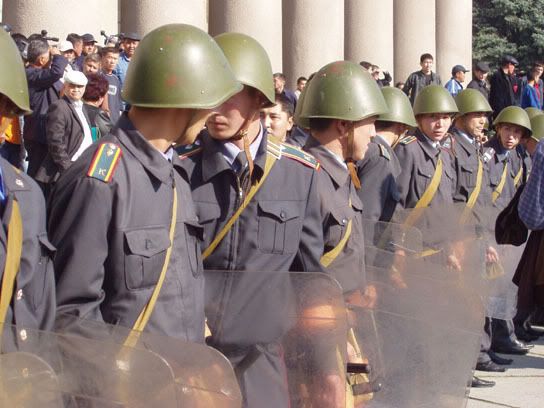Tuesday, November 21, 2006
While there has been much talk about the compromise constitution agreed upon between the government and the opposition in Kyrgyzstan, this alone is unlikely to smooth over relations between competiting political groups in the country. For this reason, one can expect that the winter will be a tense time of political negotiations in the country. To see how heated those relations got on November 7 during the showdown between pro-opposition and pro-Bakiyev protesters, see the following video that was sent to me tonight:
Blogging Lull for the Holiday
The Roberts Report will have a slow down over the next week due to the Thanksgiving holiday and a conference about the modern history of the Uyghurs that I am attending in Tokyo. If I have a chance (and a handy internet connection), I may try to post from Japan, but if not I will make sure to be back posting by December 1. I wish everybody a happy Thanksgiving whether or not they celebrate the holiday. After all, we all always have alot to be thankful for.
Meanwhile in Uzbekistan….Googoosha says let them eat cake…or is it let them wear mink?: Gulnara Karimova and Uzbekistan’s Imaginary Middle Class

Gulnara and Yudashkin at fashion show in Tashkent
In my last post, I noted the growing middle class that sets Kazakhstan apart from the rest of Central Asia. This middle class could be the driving force of gradual change in Kazakhstan as the country’s elite will need to address the needs of this emergent class in order to retain the economic stability that is keeping pockets (or Swiss bank accounts) full at the top. By contrast, while there is a thin layer of society in Uzbekistan, working for international organizations and companies or for the government, which can be concerned about more than bread, the majority of the country is living hand to mouth.
That situation, however, does not seem to worry the elite, which continues to create a world of luxurious events in order to create a Potemkin’s village of middle class lifestyle in Tashkent. The latest such event was a Valentine Yudashkin fashion show organized by President Karimov’s eldest daughter Gulnara. According to the Russian paper Kommersant, Gulnara was the center of attention and received a standing ovation when she addressed the audience (it appears that Googoosha is loved for more than her singing). As Kommersant described it, ”how can you not love the eldest daughter of the president of Uzbekistan: she is beautiful, intelligent, and elegant, like a princess from a fairy tale.”
Kommersant also notes that other luminaries in attendance included two of Russia’s wealthiest Uzbek businessmen, Iskander Makhmudov of mineral and print media fame and Alisher Usmanov, who has recently taken over the helm at Kommersant while continuing to play a prominent role in Gazprom. Apparently the piece de resistance of the evening was the presentation of a mink coat with different colored pieces constructing a “traditional” Uzbek pattern (Atlas?). The whole scenario is reminiscent of Marie Antoinette’s supposed comment about the starving French peasantry – “let them eat cake.” In this case, is the princess trying to say “let them wear mink” right before the winter cold sets in? Well, we all know what happened to Marie Antoinette.
Friday, November 17, 2006
Bread, Circuses, and Automobiles in Kazakhstan: The Emergence of a Middle Class?
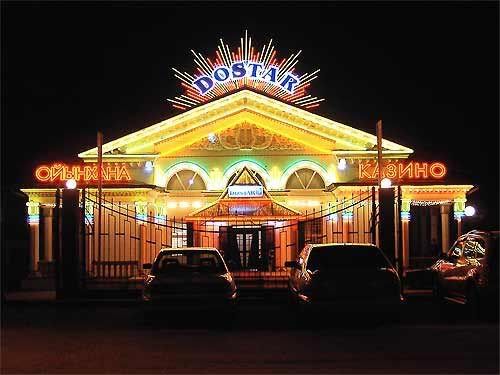
Casino in Almaty soon to be moved

You won’t be able to register this car soon in Kazakhstan
Kazakhstan’s economic reforms and natural resource wealth has helped to spawn a growing middle-class. While the concept of a middle class is difficult to define and is ultimately dependent on context, in Kazakhstan it probably would be best defined as that portion of the population that can take subsistence for granted and is focused on luxury items to make their life more enjoyable. Two recent developments point to the extent that this portion of Kazakhstan’s population is growing and will eventually be a force to be reckoned with.
The first is the recent decision of the government of Kazakhstan to launch a project to move all casinos out of major cities and create gambling zones on the model of Las Vegas. In fact, one of the locations, Kapchagai near Almaty, will be initiating a new sister city relationship with Las Vegas beginning in January of 2007. As an early indication of these plans, the Kazakh ambassador to the U.S. visited Las Vegas earlier this summer and discussed what Kazakhstan could learn from Vegas with a democratic congresswoman from Nevada. As Ambassador Kanat Saudabayev said to her, "There is no better place to learn the experience of Las Vegas than Las Vegas; we have solved the issue of bread (in Kazakhstan), now we are looking for entertainment." Indeed, this is the challenge of placating the middle-class – once bread can be taken for granted, there is increased demand for better circuses.
If the news that casinos would be moving out of the cities to recreational oases based on the model of Las Vegas was welcomed by Kazakhstan’s middle-class, the revelation that right-handed steering-wheel cars would gradually be phased out of the Kazakhstan market has created an outrage. In a protest that far outnumbered the two-person “sit-in” organized in response to violations in the presidential election, some one hundred citizens and fans of Japanese used cars gathered in Almaty’s main square on Wednesday to show their displeasure with this policy. Furthermore, protests are not only taking place in Almaty. In Semipalatinsk, there are reports of a movement to express one’s position through bumper stickers that read “Right of Wheel.” In the last several years, used right-hand steering wheel cars from Japan have grown in popularity in Kazakhstan since they are significantly cheaper than comparable automobiles brought from Europe. Thus, for the emergent middle-class, it is an important issue.
All in all, it is good to see that an emergent class is becoming more vocal in Kazakhstan, even if it is over such personal “Not In My Back Yard” issues. In reality, however, this middle-class can be expected to put more and more pressure on the government to perform and to be effective. For years now, people in Kazakhstan have been satisfied with the low expectations of stability, and the general mantra has been “at least there is no war.” Now they want circuses…and cars they can afford…and houses they can afford. Maybe soon, they will want a medical system they can trust, a court system they can trust, a media they believe, a government that does not take bribes, etc.
Tuesday, November 14, 2006
Reconfiguring the Political Landscape of Kazakhstan Once Again: Preparations for new elections or just another “red herring”?
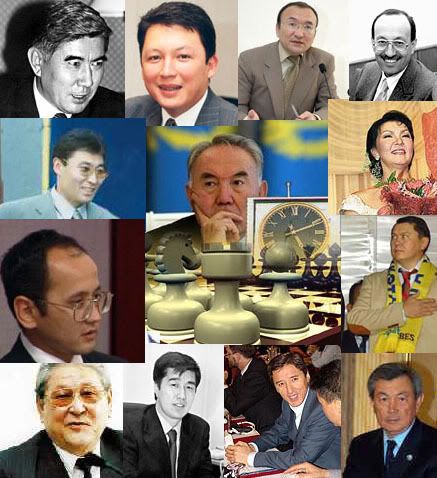
In the last couple of months, the landscape of political parties has once again transformed in Kazakhstan. Various pro-presidential parties have been combined under the umbrella of a new “Otan” mega-party that now includes the recently liquidated “Asar” and “Civic” parties. A new party named “Atamaken,” which is led by Yerzhan Dosmukhamedov and appears to have the backing of important people, has been organized to represent the interests of business people. The opposition has created a social-democratic party led by former presidential candidate Zharmakhan Tuyakbai. Alikhan Baimenov’s “Ak Zhol” party is now represented in parliament, but it is unclear that it has much constituent support anymore. The “Alga” party (formerly “Democratic Choice of Kazakhstan”) remains unregistered and appears to be marginalized in the opposition camp. Finally the “Real Ak Zhol” party, while still strong, is under siege as Bulat Abilov faces serious criminal charges that could make him Kazakhstan’s next political prisoner.
While reconfigurations of this sort always seem to occur in-between elections in Kazakhstan, the latest changes do suggest a different approach to the government’s management of political parties, at least on the pro-presidential side. As I noted earlier this summer, there have been rumors for some time that new parliamentary elections are on the horizon that will involve a system based increasingly on proportional party-list votes. While this rumor has yet to come to fruition, there is certainly a possibility that it may be in the works for the not-too-distant future. After all, the new “Otan” mega-party would certainly be well positioned for such an election.
If this were to happen, which parties would be competitive would largely depend upon various registrations that remain in process. But, if all were registered, one could expect that at least four parties would be able to draw upon significant constituencies:
- “Otan” – the party for those who seek to support the status quo and want to gain positions in government
- “Social Democratic Party” – the party of those in the opposition with left-wing sentiments
- “Atamaken” – the party for those sympathetic with liberal reforms but not wanting to be identified as in the “opposition”
- “Real Ak Zhol” – the party of those in the opposition with right-wing sentiments
Beyond these four, “Alga,” “Ak Zhol,” and the “Communist” parties, if they remain active, would also likely be able to draw upon their base supporters, but they could potentially be more important for the votes they divert from others.
Of course, these reconfigurations may also only be a “red herring” intended to occupy the political space, keep people guessing, and create movement that suggests that Kazakhstan is on the path to democratic reform. Regardless, if the past is any indications, one can expect that there will be more surprises in the configuration of political parties in Kazakhstan before an election is called, and neither the government nor the opposition has shown their full hand as of yet.
Saturday, November 11, 2006
Roberts Report Adds Central Asian Newswire Content in Russian
Given the rather specialized audience of this site, it occurred to me that many who visit it regularly are also interested in content from the internet in Russian. For this reason, I have added an additional newswire of Central Asian news from websites in Russian. I hope this is a useful feature.
Friday, November 10, 2006
The Path to a New Constitution in Kyrgyzstan: The Anatomy of a Political Crisis
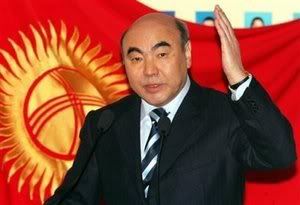
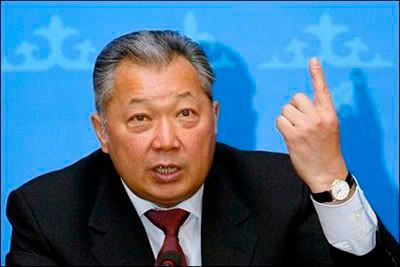
Presidents Akayev and Bakiyev of Kyrgyzstan
For people who get their news from American newspapers and television, the protests that forced president Bakiyev to sign a new constitution this week appeared to come out of nowhere. Like most political developments of this kind, however, the frustrations and problems leading to change have a history, which, when viewed with hindsight, explain why what appear to be sudden transformations have taken place. The adoption of a new constitution in Kyrgyzstan is no different.
Kyrgyzstan has been in a political transition since 2003 when former president Akayev first announced that he would not seek re-election as president of the country. At that time, the former Soviet Union had not seen many democratic presidential successions, and Central Asia had never experienced one. As Akayev’s final term came closer and closer to an end, there was increased speculation that the presidential transition in Kyrgyzstan would follow one of the three models of transition seen in recent years in the former USSR: the “hand-off” model of Russia, the familial dynastic model of Azerbaijan, or the “colored revolution” model of Georgia and Ukraine.
Throughout late 2004 and early 2005, therefore, Kyrgyzstan was becoming increasingly polarized and few in the country believed that Akayev would anoint actual democratic elections for his successor. The Aksy tragedy of 2002, the establishments of super-presidential powers through the February 2003 constitutional referendum, and the increasing corruption within Akayev’s own family all led the opposition and various civil society actors to view the February 2005 parliamentary elections with speculation, especially when it became apparent that Akayev was facilitating the election of his son and daughter to the parliament. In general, it was believed that these elections were a prelude to a plan by Akayev to facilitate a non-democratic succession for the position of president that would protect himself, his family, and their combined influence in the country.
These were the conditions that led to the March 2005 overthrow of Akayev that has become known as the “Tulip revolution.” The “Tulip revolution,” however, did not represent the efforts of a consolidated political group or a real coalition of political parties, which are extremely weak in Kyrgyzstan. While the combined forces that were behind the protests forcing Akayev from office in March 2005 included many who were interested first and foremost in democratic change, others joined the movement with aspirations of usurping power. And, there was no clear organizational structure to the movement, which had arisen more organically (but also less cohesively) than the political party led ones in Georgia and Ukraine.
The government of Kurmanbek Bakiyev and Felix Kulov that emerged from the events of March 2005, therefore, came into power under the banner of democratic change, but it did not necessarily represent a consolidated democratic movement with a concrete agenda for how to bring that change about. Since Bakiyev’s official election as president in July 2005, he has been accused of re-creating many of the mechanisms of governance that characterized the rule of Akayev by carefully avoiding major reforms through deals with individuals inside the opposition and by allegedly re-creating a familial based system of patron-client relations as a means to run the country. While Bakiyev had yet to lose his legitimacy in the face of the country’s population to the degree that Akayev had by March 2005, his rule by this September was increasingly facing challenges from others who wanted to destroy his developing patron-client based system of rule and to initiate reforms.
This was the context in which opposition leader and parliamentarian Omurbek Tekebayev was arrested in early September of this year in a Warsaw airport for possession of heroin. What happened from there is in the following posts that have appeared on this website:
- September 7:
More Trouble with the Tulip Revolution: Kyrgyz Oppositionist Omurbek Tekebayev arrested in Warsaw
- September 8:
Update on the Tekebayev incident and Events in Kyrgyzstan
- September 8:
The Tekebayev video from Manas airport in Bishkek
- September 11:
Why would Astana request that Interpol search Tekebayev?
- September 12:
Bakiyev’s brother allegedly behind provocation against Tekebayev: Will Bakiyev save himself again or will the Tulip Revolution turn into poppy dust?
- September 15:
The Political Bazaar in Kyrgystan is Open Again: regardless of who framed whom, there are bound to be some new deals on the horizon
- September 18:
Kyrgyzstan Opposition "Kurultay" Takes Place in Aksy
- October 1:
Kyrgyz Opposition call for Public Protest on November 2: Is Time Running Out for Bakiyev?
- October 3:
Kyrgyz Opposition Increasing Pressure on the Bakiyev-Kulov Tandem
- October 6:
Is the Kyrgyz Opposition Splitting over Felix Kulov?
- October 12:
Will Bakiyev Save Himself Through Dialogue (Again)?
- October 17:
Is the Kyrgyz Opposition Trying to Pull Kulov Away from Bakiyev in Advance of the November 2 Protests?
- October 25:
All eyes on Kulov and Bakiyev: Where will Kyrgyzstan be Next Week at This Time?
- October 28:
A Big Week in Central Asian News: Three Events Will Demonstrate the Variety in the Region's Political Development
- November 2:
Countdown to Kyrgyz “Maydan,” the Sequel? (Part I)
- November 3:
Kyrgyz "Maydan," the Sequel (Part 2) - Photos from Day One
- November 3:
Kyrgyz "Maydan," the Sequel (Part 3) – Day One
- November 4:
Kyrgyz “Maydan,” the Sequel (part 4): Kyrgyz Protests Hankering Down for the Long Term?
- November 5:
Kyrgyz “Maydan,” the Sequel (Part 5): Public Television and Constitution Remain Sticking Points in Kyrgyzstan’s Political Stand-off
- November 6:
Kyrgyz “Maydan,” the Sequel (Part 6): Have Bakiyev and Kulov Backed Themselves into a Corner?
- November 6:
Kyrgyz “Maydan,” the Sequel (Part 7): Does Kyrgyzstan Await a New Constitution or Violence Today?
- November 7:
Kyrgyz “Maydan,” the Sequel (Part 8): Showdown of Protesters in Bishkek?
- November 7:
Kyrgyz “Maydan,” the Sequel (Part 9): Is a Compromise Within Reach?
- November 8:
Kyrgyz “Maydan,” the Sequel (Part 10): Are Bakiyev and Kulov Trying to Pull A Fast One?
- November 8:
Kyrgyz “Maydan,” the Sequel (Part 11): The Ping-Pong of Kyrgyzstan’s Political Crisis…Will President Bakiyev Sign the New Constitution?
- November 9:
Kyrgyz “Maydan,” the Sequel (Part 12): Bakiyev Signs Compromise Version of Constitution and Political Crisis is Averted, But for How Long?)
As this background to Kyrgyzstan’s ongoing political crisis suggests, the problems behind it have yet to be fully resolved. The country, like most of the former U.S.S.R., has yet to shed its reliance on a patron-client system of power that has been present since the Soviet period. Kyrgyzstan, and most of the former U.S.S.R., also lacks the checks and balances in governance that are needed to mitigate this reliance on patron-client relations and provide for stable transitions of power. Like Georgia and Ukraine, however, Kyrgyzstan continues to struggle with ways to break out of the cycle of patron-client relationships that characterize its political terrain. While it is unclear how much the new constitution adopted this week will resolve this problem, it at least demonstrates that many in Kyrgyzstan are seeking means to change their country’s system of governance and establish stability through reform. It won’t be an easy road, but neither was that which the founding fathers of American democracy undertook in the late eighteenth century.
Thursday, November 09, 2006
Kyrgyz “Maydan,” the Sequel (Part 12): Bakiyev Signs Compromise Version of Constitution and Political Crisis is Averted, But for How Long?

Parliament celebrates after accepting draft of new constitution (Kommersant)
Today, president Bakiyev signed a new constitution into law for Kyrgyzstan. While it is not clear how the new constitution will affect the political situation in the country at present, it does suggest at least slightly increased powers for the parliament and slightly decreased powers for the president (KyrgyzReport provides a quick overview in English of some of the changes in the constitution HERE). As one Kyrgyz legal analyst notes, the real power of the new constitution depends most of all on its implementation. Reports from Kyrgyzstan suggest that the pro-Bakiyev protesters have almost completely left the area of the parliament, but there is still a significant presence of opposition protesters in the Alatoo square. Some of the opposition protesters are disappointed that Bakiyev remains in power, but the movement has generally declared the compromise a victory. The situation seems to be under control, but pressure will be placed on Bakiyev and parliament to use the new constitution to initiate significant reforms. As one sympathizer of the opposition told me, if they don’t – there will be more protests in the spring or summer. One question, for example, that remains unresolved is the status of state television, which showed itself once again to be a critical force in the partisan support of the president during this crisis. It had been one of the opposition's demands previously that state broadcasting be transformed into public broadcasting, but this question did not seem to fit into the compromise. At present, however, the question is whether the political leaders of Kyrgyzstan will use the winter to initiate real change. Otherwise, the political crisis in the country might just be entering a temporary hibernation until the weather is warm again.
Wednesday, November 08, 2006
Kyrgyz “Maydan,” the Sequel (Part 11): The Ping-Pong of Kyrgyzstan’s Political Crisis…Will President Bakiyev Sign the New Constitution?
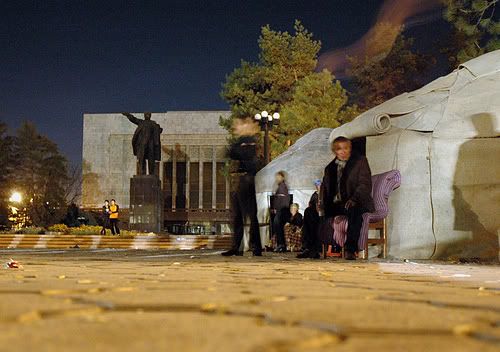
Protesters relaxing in the evening (courtesy of Theodore Kaye)
Daytime…tense…nighttime…optimistic. That seems to the story of the last several days in Bishkek as the resolution of the ongoing political struggle over the constitution in the country has see-sawed back and forth between hope for compromise and conflicts between mobs of protesters. The latest news is that the parliament has prepared a version of the constitution that it is sending to the president in the morning for signature. The opposition protesters are declaring the move a victory, and reports suggest that fireworks are going off in Alatoo square in honor of the event. The president, of course, has still not signed the document….it is not over until Bakiyev sings.
NOTE: A copy of what seems to be the proposed new version of the constitution is in Russian as a comment to this post. Click HERE for best reading. I received it second-hand via email from a reliable source, but I cannot confirm its authenticity.
Kyrgyz “Maydan,” the Sequel (Part 10): Are Bakiyev and Kulov Trying to Pull A Fast One?
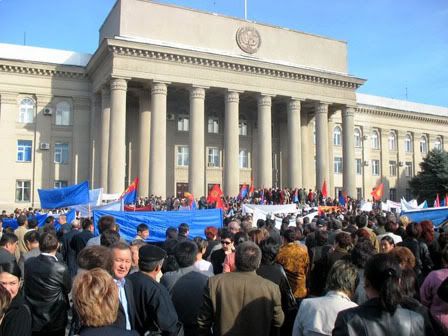
Pro-Bakiyev Protest in front of parliament (courtesy of KyrgyzReport)
After it looked like a compromise may have been within reach, it now looks like the Bakiyev-Kulov tandem is on the offensive in trying to discredit the opposition. As reported yesterday, the government has rallied its employees to participate in a large protest in front of parliament, where ten yurts have reportedly been constructed. Simultaneously, pro-government protests have been organized in the three southern oblasts of the country. According to KyrgyzReport, the protesters are calling for the dissolution of parliament, and Topchubek Turgunaliev of the Erkindik party is speaking before the crowd in Bishkek claiming that the opposition is supported by ex-president Akayev.
KyrgyzReport is also reporting that the State TV station has begun broadcasting PSAs, apparently produced under the guidance of the president’s administration, which link Akayev to the opposition protests. If Bakiyev and Kulov are pulling away from the proposed compromise, it could lead to a further deterioration of the situation. Furthermore, it is especially troubling that they are further fueling the tension between north and south in the country. Things definitely do not look as promising as they did several hours ago.
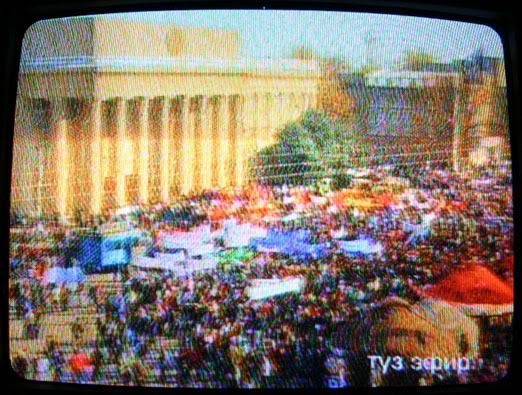
A still shot from state television showing live broadcasts of the pro-Bakiyev protests in front of parliament. (courtesy of KyrgyzReport)
Tuesday, November 07, 2006
Kyrgyz “Maydan,” the Sequel (Part 9): Is a Compromise Within Reach?
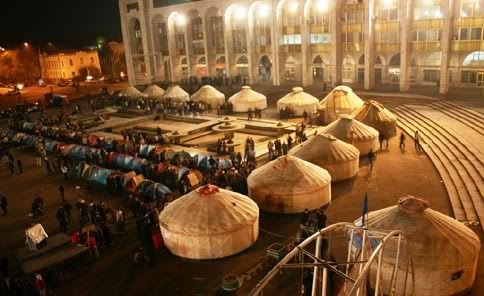
Opposition camp at night
As Bishkek went to bed tonight, it looked as if compromise might be within reach through constitutional changes. While it is too early to say that the political crisis that has evolved over the last several days has ended, reports claim that opposition deputies and pro-Bakiyev deputies have reached a compromise to consider a third version of the constitution. Speaker of parliament, Marat Sultanov, offered more details in a press conference where he outlined the major points in the proposed compromise constitution. According to Sultanov, the constitution would call for a parliament of 90 deputies, half chosen by party-list proportional vote and half chosen by single-mandate votes. If any single party gains 50% of the party-list vote, that party in parliament will have the right to form the government. Otherwise, it will be the responsibility of the president. While the president will have the right regardless to choose the head of the electoral commission, the head of the accounts office, the prosecutor general, and judges, all of these positions will need to be approved by parliament. In general, the compromise appears at the outset to be a positive development that will create more checks and balances while also resolving the political standstill in the country. As comments by readers on KyrgyzReport suggest, however, there remain many questions unanswered concerning this constitution such as whether parties can join together once in parliament to form a coalition government and whether the president will have veto powers. Hopefully, tomorrow the various parties discussing the draft will act responsibly and ensure that this version is as good as possible. We shall have to wait and see.
Also – while compromise seems to be within reach, there remains a standoff on the streets of Bishkek. Edil Baisalov, for example, reported that a group of intoxicated individuals from the pro-Bakiyev protests came to Alatoo square during the night trying to provoke opposition protesters. In addition, nothing has yet to be said about whether the many protesters from the south who are scheduled to arrive tomorrow in support of Mr. Bakiyev will still come to town. Thus, as Tuesday ended in Bishkek, there seemed to be cautious optimism, but a declaration of an end to the political crisis cannot yet be made.
Kyrgyz “Maydan,” the Sequel (Part 8): Showdown of Protesters in Bishkek?
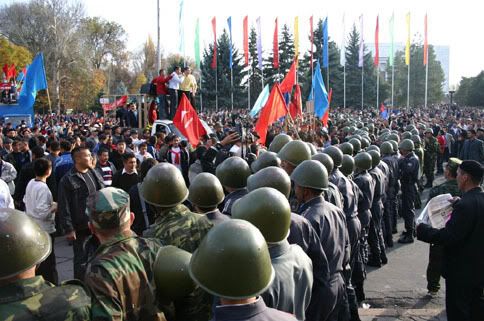
A wall of police holds back opposition protesters from pro-Bakiyev protesters near parliament building (courtesy of KyrgyzReport)
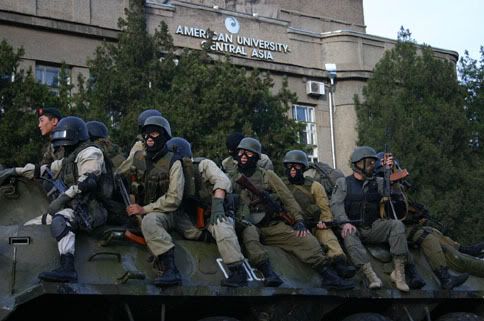
An ominous show of force in front of the American University of Central Asia (courtesy of KyrgyzReport)
As the political standstill continues in Bishkek, the stakes have been raised by dueling protests and the first signs of violence. Tuesday began with the opposition claiming that it had legally adopted a new constitution by securing 39 votes. As had been promised yesterday, this news was met with the actions of a new group of protesters in front of parliament claiming to support Bakiyev and asking for the resignation of opposition deputies. The tensest part of the day involved a standoff between opposition and pro-Bakiyev protesters in front of the parliament that ended in the police, led by SNB chief Sultalinov, using tear gas and force to disperse protesters and push the opposition protesters back to Alatoo square.
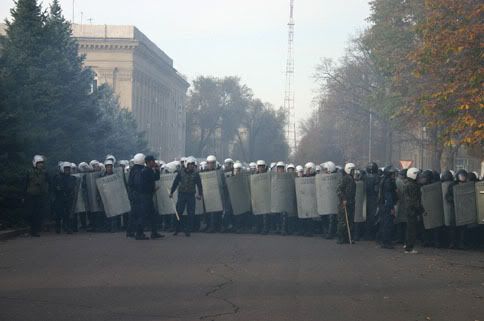
Wall of police in front of parliament (courtesy of KyrgyzReport)
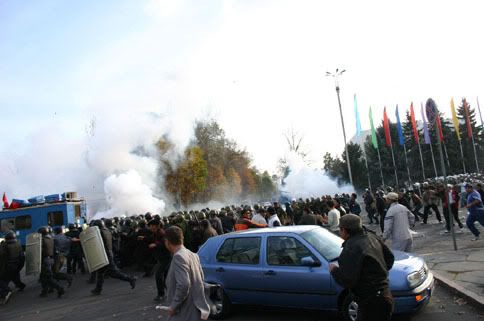
Tear gas being used to disperse protesters (courtesy of KyrgyzReport)
The most disconcerting news, however, relates to what might happen tonight and tomorrow. After the conflict in front of parliament, Sultalinov announced that all protesters will be cleared from Alatoo square this evening. Opposition protesters have also warned that further provocations from security agencies are likely tonight, suggesting that the government is planning to organize looting of local businesses as was done in March 2005. Whatever happens tonight, tomorrow is likely to be even tenser. Supporters of Bakiyev have already promised to bring in several thousand protesters from the south to join those already in front of the parliament in Bishkek. Most businesses in Bishkek are closing, and many are removing items from stores in the event that the situation spins out of control further. One can only hope that this does not become a “pay-for-protester” proxy war between the government and opposition or even worse an emergent civil conflict between north and south. The most reasonable voices in the evolving conflict appear to come from the more moderate deputies, led by speaker Marat Sultanov. This group claims to have the support of 30 deputies who are ready to adopt a compromise constitution that can lead the country out of the conflict between government and opposition.
Additional Note: I almost forgot to mention that NTS television, which has been sympathetic to the opposition cause has apparently been struggling all day with its access to electricity and its signal. For those who remember the events in February that led to the March 2005 fall of Akayev, this sounds like alot like what happened to the printing press before the election. Deja Vu?
Monday, November 06, 2006
Kyrgyz “Maydan,” the Sequel (Part 7): Does Kyrgyzstan Await a New Constitution or Violence Today?
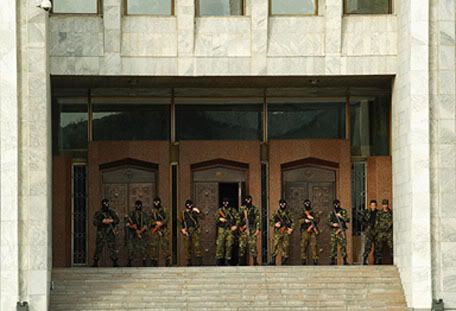
Special Forces guard Kyrgyzstan’s White House yesterday (courtesy of KyrgyzReport)
As people in Bishkek begin to awake from a long night of political crisis, it is unclear where the dust settled last night. The last news from Akipress suggested that the parliament had not succeeded in establishing the quorum it sought for voting on its new constitution. While 34 parliamentarians had signed off on the new constitution, at least four additional signatures are needed to legally adopt the constitution. According to the interpretation of the head of the constitutional court, Cholpan Bayekova, who came to parliament last night, the deputies only require a majority (38) and not two-thirds (50) to adopt the constitution due to a technicality. The 34 deputies who had signed the new constitution apparently spent the night in the building of the parliament, hoping that additional signatures would be gathered by 12 noon today.
This morning in Bishkek, nothing seems clear. If 38 deputies sign the new constitution, and the deputies claim to now be empowered under a new constitution, will this be enough of a mandate to allow them to act without the capitulation of Bakiyev and Kulov? More disconcerting, Bakiyev and Kulov have been conspicuously silent since earlier last evening. Is there something planned to discredit the parliamentarians even if they claim to have adopted a new constitution?
Commentators on KyrgyzReport offer a particularly ominous analysis of the choices left to Bakiyev and note that many of them include at least some bloodshed. Let’s hope it does not come to that. At least today is a holiday, and the city seems to be taking its time to wake up. Nonetheless, today will be a critical day that could determine the future trajectory of Kyrgyzstan politics for the near future.
Kyrgyz “Maydan,” the Sequel (Part 6): Have Bakiyev and Kulov Backed Themselves into a Corner?
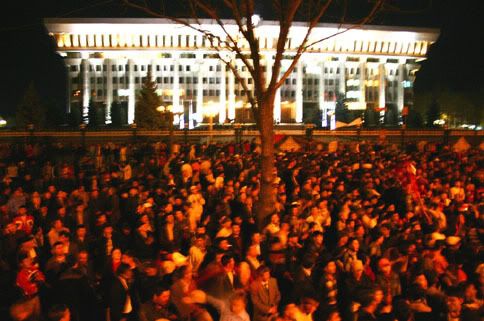

Protesters on the streets of central Bishkek on Monday (courtesy of KyrgyzReport)
As promised, Monday was a critical day in the standoff between the government and opposition protestors in Bishkek. It began with Bakiyev presenting his version of the constitution to the parliament, which is overtly pro-presidential in form. This move was not only boycotted by pro-opposition deputies, but even the speaker of the parliament (usually seen as moderate if not pro-Bakiyev), Marat Sulantov, was unsatified with Bakiyev’s proposal. Sultanov said that in response the parliament would be presenting its own alternative version of the constitution for consideration, which would serve as a compromise between the positions of the president and the protestors.
Furthermore, according to deputy Temir Sariyev, this compromise version of the constitution will be discussed overnight at parliament starting at 10:00 pm. Sariyev has also been cited as stating that there will be a “constitutional change of the government” in the next two days, suggesting that the opposition deputies may have a specific plan in mind. At about 10:30 pm, Akipress reports that deputies are arriving at parliament, but they have yet to begin the session. Akipress also reports that a large group of protesters has moved from the Alatoo square to the parliament and will await the outcome of parliamentary discussions overnight. The parliament building is apparently surrounded by police as deputies hope to get the 51 deputy quorum it needs to adopt a new constitution. If they succeed, Melis Eshimkanov says that the parliament will declare the dissolution of the government and announce the formation of a new one tonight. While Bakiyev has not been invited to the parliamentary session, Kulov apparently has been invited so that he could resign before parliament.
In the meantime, there are reports rampant that various officials are defecting to the opposition. And, in a move reminiscent of Askar Akayev’s last days, Bakiyev replaced his minister of internal affairs late in the day. It would appear that the Bakiyev-Kulov tandem is backed into a corner as the course of political events turns against them. Still, it is too early to tell for sure. Afterall, the parliament still needs 51 deputies and, as of 10:44, they only had 38 to 42 deputies present while 20-some deputies are at the home of deputy Popov and are refusing to attend the session. One thing is for sure…it is likely to be a long night in Bishkek. And, tomorrow is the 89th anniversary of the Bolshevik revolution…
NOTE:
If you read Russian, Akipress is the best source for up-to-date information on developments in Bishkek. Unfortunately, its site has been overloaded since Friday and has not been available to people outside of Kyrgyzstan. Luckily, Akipress has found a creative way to allow people outside of Kyrgyzstan to access its site—they opened a blog version of the their newsite on LiveJournal…you can find it HERE.
In English, the KyrgyzReport also provides periodic updates on the situation in Bishkek with photos.
Finally, if you want to see a frequently refreshed webcam of areas in Bishkek (now focused on the area in front of the white house), you can find that HERE
Sunday, November 05, 2006
Kyrgyz “Maydan,” the Sequel (Part 5): Public Television and Constitution Remain Sticking Points in Kyrgyzstan’s Political Stand-off

Deputy Teklebayev leads protestors on a march from Alatoo Square to the State Television station (courtesy of KyrgyzReport)
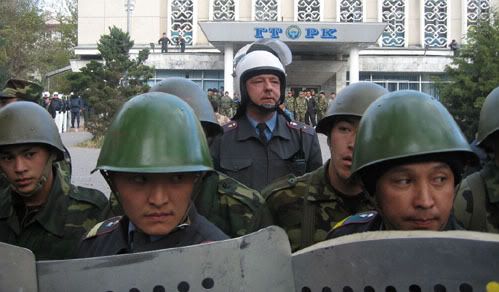
Policemen Protect State Broadcasting Headquarters from Protestors (courtesy of KyrgyzReport)
Sunday’s protests continued to push both opposition and government further from compromise. According to the KyrgyzReport, protests were organized Sunday in Tokmak, Lebedinovka, and other towns in Chui Oblast’ in support of the main rally on Bishkek’s Alatoo square. Unfortunately, there is no further information about these regional protests. KyrgyzReport also tells us that during the day on Sunday, a group of opposition supporters also marched to the state television station to demand that the station be transformed into public broadcasting and that, in the interim, it broadcast balanced coverage of the political developments in the country. This action reinforced the importance of public broadcasting in the opposition’s demands of the sitting government. The other critical issue in the opposition’s demands relates to constitutional reform. President Bakiyev had promised to present his preferred version of a new constitution to parliament today, but the opposition claims they have secured a large enough boycott by deputies to prevent a vote on the constitution on Monday. A press conference held by Mels Eshimkanov, Roza Otunbayeva, and Edil Baisalov Sunday evening again reinforced the resolve of the opposition to continue its protests until the president either resigns or meets the demands of the protestors. Edil also reports on his blog that Kulov has begun his own public campaign to dissuade people from joining the protestors. Kulov apparently has mobilized people to gather signatures against the protestors through a public letter he has addressed to the Kyrgyz people.
Virtually all sources on the web agree that Monday will be a critical day. More protesters are expected to arrive in Bishkek, and Bakiyev will try to get parliament to vote on his version of a new constitution. On Kyrgyzstan’s Diesel Forum, the tension is apparent in people’s posts, and one person has posted the picture below that shows a growing military presence on the square early Monday morning that is obviously meant to intimidate the protestors.
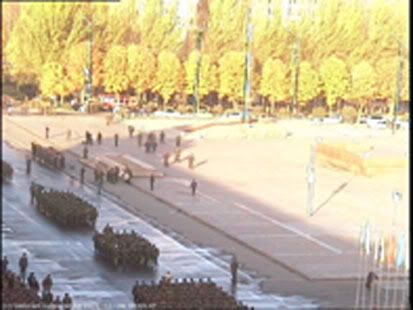
Tajik Presidential Elections: An Opportunity Squandered?
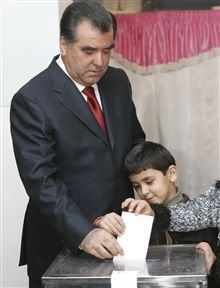
Talk given at a panel on the Tajikistan election at IFES in Washington, DC on November 1, 2006
As Tajikistan gets ready for its presidential elections next week, the thought that continues to go through my mind is that the government of Tajikistan is passing up an important opportunity to demonstrate its interest in more fully integrating into the international community. Taking serious strides to reform the country’s electoral system during this election would have won Tajikistan significant praise internationally and would have instilled confidence in foreign investors. Instead, the Government of Tajikistan appears to have made only cursory improvements in its electoral system and its implementation, leaving an impression that the country is not ready for democracy.
In general, observers of Tajikistan’s political realm do not expect much from these elections. As the second presidential elections to be held since the end of the civil war, it is thought that Tajikistan requires time to heal from the wounds of the war’s violence. Not expecting much from the elections, however, also translates into low expectations of Tajikistan in general, and that is not good for the country’s development and international profile. Most importantly, it is not good for foreign investment.
In my estimation, Monday’s elections are a critical event in Tajikistan’s political development, and the Tajik people and government should expect more than the election will actually deliver. Central Asia is quickly changing, and each country in the region is increasingly taking its own path towards the future. In terms of governance, there are two models emerging in the region – one is a gradual adoption of democracy, which is apparent in Kazakhstan and Kyrgyzstan, albeit not without growing pains. The other is a hard-line authoritarian system that differs politically only nominally from the Soviet system, which is apparent in Uzbekistan and Turkmenistan. In my opinion, Tajikistan has yet to demonstrate which way its political system is headed—in the direction of democracy or in the direction of increased authoritarians. If this election is any indication, the direction does not look very promising.
Yes, Tajikistan does have multiple political parties, and on the surface that makes it look like it is a country that is gradually accepting democracy. That being said, with the exception of the People’s Democratic Party and the Communist party, none of the major parties in the country have chosen to participate in Monday’s election. While the government can point to the fact that the various opposition parties in the country chose themselves not to run presidential candidates, it should also be noted that there were not signs from the state that they would be given a fair opportunity to participate.
If one is to disregard Turkmenistan (which essential has not had anything approximating real competitive elections since independence), only Uzbekistan lags behind Tajikistan in the implementation of elections in the region. Tajikistan does not allow domestic non-partisan monitors to observe elections. Election commissions in Tajikistan are formed through a top-down process that originates with the President. Tajikistan’s media, particularly national-level television, is tightly controlled, and the government regularly closes down opposition newspapers that become popular. While the Government of Tajikistan eventually changed its decision on the regulation of the internet during this election campaign, initially the government blocked access to three websites that are the most critical of the government and its implementation of democracy.
To be perfectly honest, it is difficult to look at Monday’s elections and see them as an improvement on the past. This has also apparently not escaped the attention of Tajik citizens. Both from media reports and from the OSCE interim report, one gets an impression that the people of Tajikistan have virtually no interest in Monday’s elections. The operative words used in most reports are passivity and indifference. While people will undoubtedly turn up at polling stations as they had throughout the Soviet period, there is neither lively public debate about the election nor an excitement on the part of the populous about participating in the elections. In short, the elections will not serve what should be their most important function – empowering citizens through giving them a voice in choosing their government. Such empowerment at this point in Tajikistan’s development is critical if the country is to leave its Soviet past behind and flourish as an economically viable part of the international community in Central Asia. Most unfortunate, this election could have been much different. The majority of the country has confidence in the president, and Mr. Rakhmanov would have undoubtedly won the election regardless of the degree of control over the process. In this context, this election provided a great opportunity to begin implementing reforms in the electoral system and to allow for serious competition for the first time in Tajikistan’s short history of independence.
Having said all of this, I do not want my comments today to merely serve as criticism of Tajikistan. It is an important country with great human capital. It is a country that could play a critical role in the ongoing reconstruction of Afghanistan as well as in the security of southwest Asia more generally. To realize this potential, however, Tajikistan needs to demonstrate serious interest in political reform. Such reform does not need to happen overnight, but it needs to begin with earnest political will from the highest levels if the country is to stay competitive in the region.
While it may be too late to make Monday’s elections into a meaningful political event for the country and its people, this election could become a springboard for future reform. I am quite sure that nobody who is familiar with the situation in Tajikistan doubts the victory of president Rakhmanov on Monday. With a new mandate to lead the country, it is critical that Rakhmanov outline a roadmap for political and civic reform. First and foremost, such a roadmap needs to empower independent media in the country to increase public discussion of political issues of concern to the population. Along these lines, the country needs to reform its media regulations and encourage all who wish to establish media outlets to do so without financial and political hindrances. In addition, the Tajik government must focus on creating a level playing field for the development of political parties, which will provide people with vehicles to express differing opinions in an environment that is not hindered by fear and control. Among other things, this would require the president personally ensuring that all political parties can work freely throughout the country regardless of the political orientation of local government officials. Finally, Tajikistan must undertake electoral reform, including the allowance of non-partisan observers and the establishment of an improved mechanism for the formation of electoral commissions that can be trusted to implement free and fair elections. I can say with confidence that political will for such reforms at the highest levels in the Tajik government would be met with significant assistance from the United States and the EU, which already are trying with difficulty to implement programs to promote democracy in the country. Tajikistan, for example, would be a prime candidate for the Millennium Challenge Account program of the U.S. government, which could bring significant investment and assistance into the country’s public and private sectors. Before it could qualify for such a program, however, Tajikistan would need to demonstrate serious intentions to reform its political system and to promote the observation of human rights.
If the country does not pursue such reforms, Tajikistan may also face a host of problems over the next decade. A population that is not integrated into official political processes, for example, is vulnerable to underground and radical movements that can undermine governmental authority through discrete channels. We have already seen that radical organizations such as Hizb-ut-tahrir are growing in popularity in the country by praying on the disenfranchised and the politically and economically frustrated. The longer that Tajikistan’s political system does not allow for the growth of a citizenry that is empowered by elections, a free media, and a field of viable and competitive political parties, the more popularity one can expect such organizations to garnish. Given Tajikistan’s proximity to the volatile states of Afghanistan, Pakistan, and Iran, an increase in the political activities of such underground radical organizations can only destabilize the country.
Likewise, while managed democracy provides for short-term stability, its long-term prospects have proven problematic. Foreign investors, whether from the U.S., Russia, or Kazakhstan are acutely aware of this, and they will continue to approach Tajikistan with caution as long as the country’s political system appears to lack the mechanisms to ensure long-term stability.
Finally, without political reforms, Tajikistan risks squandering its human capital. The restrictions on the availability to information in Tajikistan over the long term will lead to an increasingly passive and poorly informed population that will have difficulty competing with neighboring countries. Furthermore, the best and brightest in Tajikistan will seek more open environments in which to work. As such, the country will only face increasing difficulties in cultivating a viable state and a growing economy.
In closing, I want to reiterate that I am being especially critical of the upcoming presidential elections because I truly believe that Tajikistan has great potential that is yet unrealized. While the country’s slower path to political reform is understandable in the context of the bloody civil war that Tajikistan experienced at the onset of independence, the country should now be ready to move forward if it is to be a sustainable state that is regionally competitive. I think it is fair to say that the fifteen years since the fall of the Soviet Union have taught both those in the former USSR and those outside that the transition from Soviet socialism to democracy and a viable free economy is not simple. They are not developments that happen overnight, but they are developments that require serious long-term reform efforts. Most importantly, however, they are processes that are intertwined. It is wrong to believe that political reform can happen without economic development, but it is equally erroneous to assume that economic development can continue without steps towards democratic reform. This is the challenge that Tajikistan faces today. And, it is difficult to make the case that Monday’s elections will be a significant step forward in the development of democracy in the country. That being said, there is no reason that this election cannot serve as a watershed for Tajikistan. Once the votes have all been cast and counted and the international observers have left the country, president Rakhmanov could begin a well-planned program of political reform that would ensure that the next time a presidential election is held in the country in 2013, it will represent a free and fair competition with significant public participation. Such steps would also provide a clear indication that Tajikistan is on a gradual path to establishing a sustainable and viable democracy, separating it clearly from the increasingly closed states of Turkmenistan and Uzbekistan in the region.
Saturday, November 04, 2006
Kyrgyz “Maydan,” the Sequel (part 4): Kyrgyz Protests Hankering Down for the Long Term?
Protests continued for the third day on Saturday, and thanks to the new Kyrgyz Report blog, we have photos of the activity.
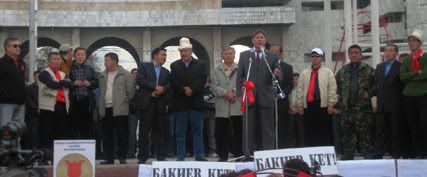
Leaders of movement speaking before crowd during daytime rally (courtesy of the KyrgyzReport)
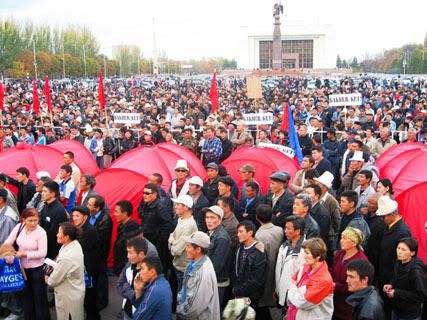
Crowd listening to speakers on Alatoo Square this Saturday (courtesy of the KyrgyzReport)
The government continues to view the protests as essentially anti-constitutional, accusing the organizers of preparing an attempted coup. While the organizers, and NGO leader Edil Baisalov in particular, essentially confirm that the audiotape the government are using as evidence of the planned coup is real, they deny that they have any violent actions planned. Instead, as Baisalov notes in an interview with Kyrgyzstan’s Akipress, they began the protests with the intentions of calling for the resignation of Bakiyev and Kulov, and there is nothing unconstitutional about that. Baisalov further noted that he is ready to give his testimony to the security forces about the intentions of the protests because it will only provide another opportunity to explain the “For Reform” movement’s intentions.
Generally, a smaller group of protestors is spending each night on the square while the crowds grow during the daytime. Last night, six large yurts were set up as an addition to the hundred and fifty some small tents already in place.
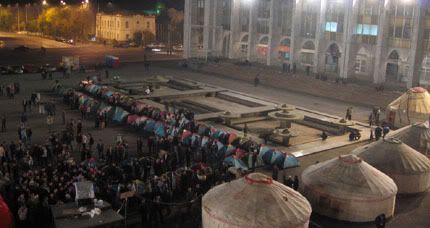
Tent and Yurt encampment Saturday night (courtesy of the KyrgyzReport)
Baisalov, who appears to have become the protest organizers’ primary contact for media, has further noted that more yurts are expected to be constructed Sunday by new groups joining the protest from various regions around the country. According to Baisalov, Sunday will likely be the largest crowd to join the protest in Bishkek to date, and they will be treated to a large concert in the middle of the day. Other reports add that the protests will also spread on Monday to include local gatherings in various locations around the country.
In general, it does not appear that a compromise is in the works anytime too soon. Numerous parliamentarians have already signed on to a pledge to boycott the president’s planned address to parliament on Monday. The government continues to remain steadfast in its accusations of a planned coup, and it has initiated criminal cases against several organizers of the protest. And, as the KyrgyzReport tells us, the coverage on television appears to be mostly pro-government rhetoric, with the exception of NTS which is showing “no-comment” footage of the protest.
The next few days are likely to be extremely tense.
NOTE: Many of the links in this post are often off-line due to problems accessing Kyrgyzstan-based websites from abroad at the moment. Websites that are difficult to access now include www.akipress.org and www.24.kg. The reasons for these problems are unknown.

Leaders of movement speaking before crowd during daytime rally (courtesy of the KyrgyzReport)

Crowd listening to speakers on Alatoo Square this Saturday (courtesy of the KyrgyzReport)
The government continues to view the protests as essentially anti-constitutional, accusing the organizers of preparing an attempted coup. While the organizers, and NGO leader Edil Baisalov in particular, essentially confirm that the audiotape the government are using as evidence of the planned coup is real, they deny that they have any violent actions planned. Instead, as Baisalov notes in an interview with Kyrgyzstan’s Akipress, they began the protests with the intentions of calling for the resignation of Bakiyev and Kulov, and there is nothing unconstitutional about that. Baisalov further noted that he is ready to give his testimony to the security forces about the intentions of the protests because it will only provide another opportunity to explain the “For Reform” movement’s intentions.
Generally, a smaller group of protestors is spending each night on the square while the crowds grow during the daytime. Last night, six large yurts were set up as an addition to the hundred and fifty some small tents already in place.

Tent and Yurt encampment Saturday night (courtesy of the KyrgyzReport)
Baisalov, who appears to have become the protest organizers’ primary contact for media, has further noted that more yurts are expected to be constructed Sunday by new groups joining the protest from various regions around the country. According to Baisalov, Sunday will likely be the largest crowd to join the protest in Bishkek to date, and they will be treated to a large concert in the middle of the day. Other reports add that the protests will also spread on Monday to include local gatherings in various locations around the country.
In general, it does not appear that a compromise is in the works anytime too soon. Numerous parliamentarians have already signed on to a pledge to boycott the president’s planned address to parliament on Monday. The government continues to remain steadfast in its accusations of a planned coup, and it has initiated criminal cases against several organizers of the protest. And, as the KyrgyzReport tells us, the coverage on television appears to be mostly pro-government rhetoric, with the exception of NTS which is showing “no-comment” footage of the protest.
The next few days are likely to be extremely tense.
NOTE: Many of the links in this post are often off-line due to problems accessing Kyrgyzstan-based websites from abroad at the moment. Websites that are difficult to access now include www.akipress.org and www.24.kg. The reasons for these problems are unknown.
Friday, November 03, 2006
Borat and the Kazakhstan National Anthem: Is this the Armenian lobby at work?
For those who have not been able to catch the Borat film yet, make sure that you stay for the credits if you do go. At the very end, the film has its own satirical version of the Kazakhstan national anthem. Interestingly, the very final frame of the montage that accompanies the anthem shows the face of a president superimposed on the waving flag of Kazakhstan....only, it is not Nursultan Nazabayev's face, but a colleague of his. After seeing that, I am surprised people haven't started conspiracy theories that the film was funded by the Armenian lobby.
If you can't wait for the suprise, here is the segment from youtube:
UPDATED INFORMATION: If one needs additional reason to fuel this conspiracy theory (in which, I myself do not believe) about the Armenian connection to Borat, neweurasia.net's Armenia blog has provided some interesting tidbits. It turns out that the fictional producer of the film, Azamat Bagatov, is actually played by an Armenian by the name of Ken Davitian, and he speaks Armenian throughout the film when he talks with Borat. Hmmmm...the more I think of it, perhaps the whole film is a conspiracy to undermine the BTC pipeline...................NOT
If you can't wait for the suprise, here is the segment from youtube:
UPDATED INFORMATION: If one needs additional reason to fuel this conspiracy theory (in which, I myself do not believe) about the Armenian connection to Borat, neweurasia.net's Armenia blog has provided some interesting tidbits. It turns out that the fictional producer of the film, Azamat Bagatov, is actually played by an Armenian by the name of Ken Davitian, and he speaks Armenian throughout the film when he talks with Borat. Hmmmm...the more I think of it, perhaps the whole film is a conspiracy to undermine the BTC pipeline...................NOT
Kyrgyz "Maydan," the Sequel (Part 3) – Day One
While people were fairly tense concerning the protests that began in Bishkek yesterday, by the end of the day people in Kyrgyzstan’s capital seemed more relaxed. Tents remained on the square overnight, and people in Bishkek seem to suggest that they may stay there for some time. Edil Baisalov provides some first hand accounts of the position of the protests’ organizers on his blog. Edil suggests that the media is portraying the protests fairly. He also notes that while there are no plans for any forced occupation of government buildings, the protest’s organizers have come to a conclusion that there is no longer room for compromise. The only result can be the resignation of Bakiyev and Kulov. Edil, however, does suggest that he feels it may be possible to negotiate with Usenov and Madumarov. Others in Bishkek have told me that many in the opposition seem disappointed that Kulov has not defected to their side as they had apparently hoped up to the last minute. Observers have also told me that while both sides seem to be positioning themselves without options for compromise, there may be hope that this latest conflict between the government and the opposition could finally push forward the agenda of constitutional reform. For the time being, however, we will need to watch what happens in Bishkek closely in order to understand where the country is headed.
PS--see pictures of the first day of protests below sent by an annonymous source
PS--see pictures of the first day of protests below sent by an annonymous source
Kazakhstan, Borat, and U.S. Policy: Do We Really Get the Joke?
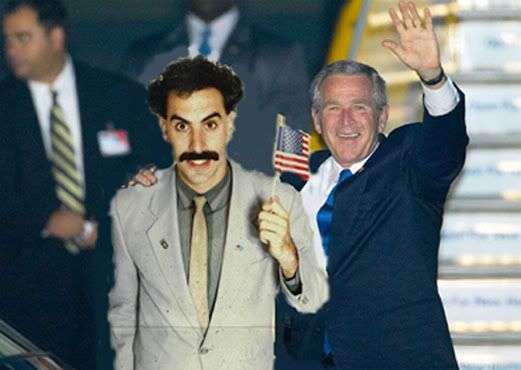
The public relations department at 20th Century Fox loves the Kazakhstan government, which has done more than anybody to promote the studio’s new film, Borat: Cultural Learnings of America for Make Benefit Glorious Nation of Kazakhstan. For over a year, the Kazakhstan government has been complaining about Borat’s negative portrayal of its nation. The film’s real joke, however, is not about Kazakhstan; it is about the United States of America and our geographically-challenged population.
It has been estimated that only about 20% of Americans even own passports allowing them to travel abroad. Considerably fewer Americans could locate Kazakhstan on a map, and few of those could probably claim to know anything about life in Kazakhstan. For global policemen, Americans have a limited understanding of the world around them.
It would be bad enough if this was only true of the average American on the street, but even our government officials have difficulty understanding the world they profess to police. Our engagement of Kazakhstan is a perfect example. The United States does not have a coherent policy towards Kazakhstan and the region of Central Asia. Instead, special interests are more often than not able to lobby our policies in different directions, creating contradictory stances that reflect poorly on the United States.
Part of the problem is that U.S. foreign policy is presently based on hyperbole. In the war on terror, the Bush administration has adopted a black-and-white policy that suggests that other countries are “either with us or against us.” At the same time, Bush has declared war on autocracy and tyranny globally, suggesting that the U.S. will “end tyranny in our world.” In the war on terror, Kazakhstan is with us. In the war on tyranny and autocracy, it is against us. Such contradictions expose the flawed nature of the Bush administration’s black-and-white vision of the world.
Recently, Britain’s Channel Four, where Borat had his beginnings, published a list of “five things you should know about Kazakhstan.” While its list was complimentary of the country in an attempt to counterbalance Borat’s insults of Kazakhstan, a more realistic list should be packaged in an even number to reflect both sides of the story. Along those lines, I offer six things Americans should know about Kazakhstan:
1) Kazakhstan is a major oil producer and is assisted by U.S.-based companies in producing 1.5 million barrels of oil a day, with ambitious to raise this production to as much as 3.5 million barrels a day by 2015;
2) In its fifteen years of independence, Kazakhstan has not held one election that European observers could reasonably call “free and fair”;
3) Since 2000, Kazakhstan’s economy has grown at an average of 9% a year, and the U.S. trade volume with the country has doubled since 2004;
4) Kazakhstan continues to arrest opposition figures for political reasons, and two of its most vocal opposition politicians were found dead within the last twelve months under suspect circumstances;
5) Kazakhstan has a majority Muslim population with pro-western orientation, and its well-financed and sophisticated banking sector has the potential to be a critical foreign investor in such fragile states as Afghanistan, Kyrgyzstan, and Georgia;
6) The Kazakhstan government regularly violates the rights to free speech and assembly by strictly controlling its media sector and by continually harassing and curtailing the activities of opposition political parties.
Kazakhstan is a complex country that defies simple characterization. It is an important country geopolitically, and the U.S. should seek to be its reliable partner for the long-term. At the same time, any U.S. strategic partnership with Kazakhstan must include a concerted effort to push the country’s government on political reform. Such a policy would serve U.S. interests in ensuring that Kazakhstan can become an anchor of stability in an extremely fragile part of the world. It would require, however, that the U.S. develop a sophisticated knowledge of Kazakhstan’s situation and undertake a long-term commitment to being involved in Central Asia. It remains far easier to address special interests as they develop and to try to paint Kazakhstan in black and white terms as needed.
In many ways, this is why Americans have been duped by the simple characterization of Kazakhstan in the guise of its fictional journalist Borat. When Borat’s film opens at multiplex theatres around the country today, it will be much easier for Americans to laugh at the satirical portrayal of a country about which they know virtually nothing than to learn a lesson about our own lack of sophistication in understanding the world around us. The film, of course, could be read in either of these ways, which is why it will likely be a success whether or not Americans really get its joke.
Thursday, November 02, 2006
Countdown to Kyrgyz “Maydan,” the Sequel? (Part I)
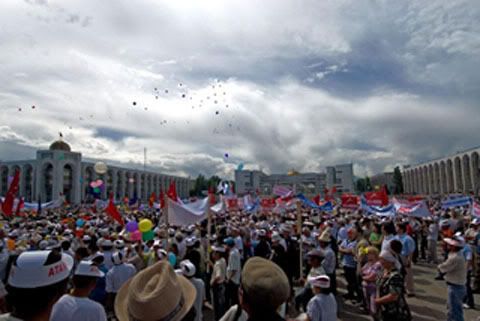
Crowd in Alatoo square at protest during 1st anniversary of Tulip revolution this past March
By the time most of you are reading this, the opposition protests in Bishkek should have begun. According to several sources, Bakiyev had agreed yesterday to accept a new constitution that gives increased power to the parliament , but the opposition bloc “For Reform” wants to see it signed today in parliament in order to call off the protests that are scheduled to begin at 2:00 pm. The opposition also claims that several of the demands have not been accepted by the president, including the request to fulfill the president’s campaign promise to transform state broadcasting into public broadcasting.
Sources in Bishkek report that Bakiyev and Kulov were both in parliament this morning. The constitutional draft they presented to Bakiyev would have given the responsibility of forming the government to a parliamentary majority, but Bakiyev refused to sign it. If Bakiyev sticks to this line, it is likely that the protests will go through. At 9:45 am, reports say that 2000 police are in the square in Bishkek. The atmosphere is tense.





